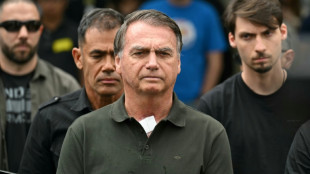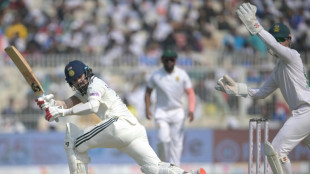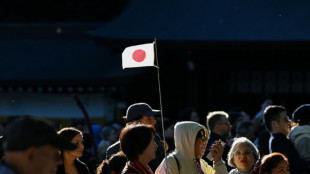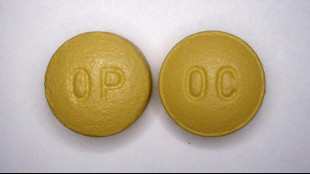
-
 Alcaraz secures ATP Finals showdown with great rival Sinner
Alcaraz secures ATP Finals showdown with great rival Sinner
-
England captain Itoje savours 'special' New Zealand win

-
 Wales's Evans denies Japan historic win with last-gasp penalty
Wales's Evans denies Japan historic win with last-gasp penalty
-
Zelensky renews calls for more air defence after deadly strike on Kyiv

-
 NBA's struggling Pelicans sack coach Willie Green
NBA's struggling Pelicans sack coach Willie Green
-
Petain tribute comments raise 'revisionist' storm in France

-
 Spain on World Cup brink as Belgium also made to wait
Spain on World Cup brink as Belgium also made to wait
-
Spain virtually seal World Cup qualification in Georgia romp

-
 M23, DR Congo sign new peace roadmap in Doha
M23, DR Congo sign new peace roadmap in Doha
-
Estevao, Casemiro on target for Brazil in Senegal win

-
 Ford steers England to rare win over New Zealand
Ford steers England to rare win over New Zealand
-
Massive march in Brazil marks first big UN climate protest in years

-
 Spain rescues hundreds of exotic animals from unlicensed shelter
Spain rescues hundreds of exotic animals from unlicensed shelter
-
Huge fire sparked by explosions near Argentine capital 'contained'

-
 South Africa defy early red card to beat battling Italy
South Africa defy early red card to beat battling Italy
-
Sinner beats De Minaur to reach ATP Finals title match

-
 Zelensky vows overhaul of Ukraine's scandal-hit energy firms
Zelensky vows overhaul of Ukraine's scandal-hit energy firms
-
South Africa defy early red card to beat Italy

-
 Alex Marquez claims Valencia MotoGP sprint victory
Alex Marquez claims Valencia MotoGP sprint victory
-
McIlroy shares lead with Race to Dubai title in sight

-
 Climate protesters rally in Brazil at COP30 halfway mark
Climate protesters rally in Brazil at COP30 halfway mark
-
Spike Lee gifts pope Knicks jersey as pontiff meets film stars

-
 BBC caught in crossfire of polarised political and media landscape
BBC caught in crossfire of polarised political and media landscape
-
'Happy' Shiffrin dominates in Levi slalom for 102nd World Cup win

-
 Palestinian national team on 'mission' for peace in Spain visit
Palestinian national team on 'mission' for peace in Spain visit
-
Brazilian 'Superman' cheers child cancer patients in Ghana

-
 India close in on win over South Africa after Jadeja heroics
India close in on win over South Africa after Jadeja heroics
-
Huge explosions rock industrial area near Argentina's capital

-
 Bezzecchi takes pole for Valencia sprint and MotoGP
Bezzecchi takes pole for Valencia sprint and MotoGP
-
Dominant Shiffrin leads after first slalom run in Levi

-
 Nine killed in accidental explosion at Indian Kashmir police station
Nine killed in accidental explosion at Indian Kashmir police station
-
Climate protesters to rally at COP30's halfway mark

-
 Fighting South Africa lose Rickelton after India 189 all out
Fighting South Africa lose Rickelton after India 189 all out
-
Harmer leads South Africa fightback as India 189 all out

-
 Prison looms for Brazil's Bolsonaro after court rejects his appeal
Prison looms for Brazil's Bolsonaro after court rejects his appeal
-
EU bows to pressure on loosening AI, privacy rules

-
 India close in on lead despite South African strikes
India close in on lead despite South African strikes
-
Curry's 49 points propel Warriors in 109-108 win over Spurs

-
 NZ boxer Parker denies taking banned substance after failed test
NZ boxer Parker denies taking banned substance after failed test
-
Australia setback as Hazlewood ruled out of 1st Ashes Test

-
 Australia pace spearhead Josh Hazlewood ruled out of 1st Ashes Test
Australia pace spearhead Josh Hazlewood ruled out of 1st Ashes Test
-
UN Security Council to vote Monday on Trump Gaza plan

-
 Japan's Tomono leads after men's short program at Skate America
Japan's Tomono leads after men's short program at Skate America
-
China tells citizens to avoid Japan travel as Taiwan row grows

-
 Purdue Pharma to be dissolved as US judge says to approve bankruptcy
Purdue Pharma to be dissolved as US judge says to approve bankruptcy
-
Iran's first woman orchestra conductor inspires

-
 Wood gets all-clear in boost for England
Wood gets all-clear in boost for England
-
Golf's world No. 8 Thomas has back surgery

-
 Rebooted Harlem museum celebrates rise of Black art
Rebooted Harlem museum celebrates rise of Black art
-
'Desperation in the air': immigrant comics skewer Trump crackdown


Brazilian ritual root gets second life as potential anti-depressant
Long used in Indigenous Brazilian rituals, the jurema preta plant, which contains a potent psychedelic, is gaining ground as a potential treatment for depression.
At street stalls where medicinal herbs are sold, customers can buy the plant's root which contains dimethyltryptamine (DMT), a hallucinogenic substance that researchers say could be used to alleviate symptoms.
Following instructions he found on the internet, Guaracy Carvajal extracted DMT at home in 2016 from roots he bought on the street.
The 31-year-old software programmer, who had tried various treatment for chronic depression he has suffered since adolescence, said the drug makes it "feel like you've solved something in your life."
Physicist Draulio Araujo, who has conducted extensive research on the drug, said "the response is rapid. One day after treatment, (patients) already showed a significant improvement in their depression symptoms."
Yet he also warned that it "is not a magic cure" and that psychedelics "are not for everyone."
As a researcher at the Brain Institute of the Federal University of Rio Grande do Norte, Araujo and his team treated 14 people with the drug for six months.
The patients inhaled vaporized DMT, under medical supervision.
"It's common for our patients to say that something changed, that a key opened something," he said.
His patients also received psychological therapy, and some continued with conventional pharmaceutical drugs.
Neuroscientist Fernanda Palhano-Fontes, also of the Brain Institute, said "we have patients who improve significantly, others who don't improve at all."
Araujo's findings were published in the scientific journal Nature in April. In 2024, he published another study with promising results in the journal Psychedelic Medicine.
As for Carvajal, who stopped using jurema preta some time ago, he said the drug really allows a person to "start to have a lighter life."
It helped him get through a time when he was in "a state of questioning myself" about "work, day-to-day life," he said.
- Spiritual channels -
Brazil occupies a fairly prominent place in DMT research due to the substance's prominence in society, Araujo said.
While there is no ban on the cultivation or possession of jurema, which is also known as Mimosa tenuiflora, consumption of DMT is prohibited, except for religious and scientific use.
Jurema's roots are combined with other plants in a wine-like beverage that is consumed at rituals that include dancing and drums, part of Indigenous tradition in northeast Brazil where the plant grows.
"It's not hallucination," said Joyce Souza, a young woman attending a jurema ceremony in Planaltina, on the outskirts of Brasília.
"My spiritual channels become more accessible, I can communicate better with myself," Souza said.
Gathered in a house courtyard and dressed in white, the group of mostly novices waited for more seasoned practitioners to enter a trance and bring messages from ancient spirits.
Meanwhile, back in the lab, Araujo is hoping to expand his DMT research to a study of 100 patents.
"Let's say that in five years we'll have... a clear picture on when it will reach a real clinical setting," he said.
F.AbuZaid--SF-PST



